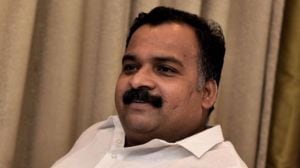Stay updated with the latest - Click here to follow us on Instagram
Folk Lore
Growing up in a traditional Bengali home,even if it was in Delhi,meant that most of music director Shantanu Moitras sensibilities were shaped by the folk music of the region.
Music director Shantanu Moitra is all set to turn director with a documentary series on Indian folk music
Growing up in a traditional Bengali home,even if it was in Delhi,meant that most of music director Shantanu Moitras sensibilities were shaped by the folk music of the region. In a way,it was my initiation into the world of music. It was something that has always been an intrinsic part of my life,which film music looked to adapt and take forward, he says. Yet,after his foray into Bollywood,Moitra was disappointed with the way folk music was getting lost in the milieu. Nowadays the only notable trace of folk music,apart from films,is the boutique-y effort that you see when foreign dignitaries come visiting. It loses its charm if you have engineered it. I felt that as a musician,I needed to document the various living traditions of folk music in the country, he says. So now,Moitra is busy traversing the breadth of India,absorbing various folk genres,capturing them through his lens,in an effort to weave a 16-part television documentary out of it. Talks are on with several channels,though a definitive deal is yet to emerge.
The music director,who has scored music for hit films like Haazaron Khwaishein Aisi,Parineeta and Lage Raho Munna Bhai has divided the country into roughly eight musical zones with two episodes being devoted to each zone. I have just come back from a tour of the Northeast,from the Hornbill Festival in Nagaland. Research is on for Rajasthan,and we shall focus on it next, he says. The idea behind the series,says Moitra,is to document not only the musical tradition of the region,but also to focus on the social,cultural and economic patterns that emerge out of it. For example,theres a lot of similarity between Naga and African music because both evolved out of war rituals,where musical rhetoric was used to pump up the soldiers, he explains.
Behind-the-camera knowhow is probably the last thing on a music directors mind,but during his stint with Vidhu Vinod Chopras production house,Moitra would hang around with Chopra,picking up directorial skills,learning about camera angles from the technical crew and generally being in the know about filmmaking. That experience comes in handy now. One of the tips that I picked up during my interaction with Chopra is that sometimes the best directorial work emerges when you let people do their job. I am trying to follow the dictum while shooting,and am also trying to put together a sound technical crew, he says. Accordingly,Moitra is meeting up with Emmy-winning cinematographer Richard Kirby of The State of the Planet fame in February. I want him to bring to music the same spontaneity that he brings to wildlife documentary, he says.
The documentary series apart,Moitra is also busy with his usual composition work in tinsel town. Theres Rajkumar Hiranis Three Idiots with Aamir Khan,Kareena Kapoor and Sharman Joshi. But before that he is looking forward to his maiden foray into the Bengal film industry. I have scored the music for National Award-winning filmmaker Aniruddha Roy Chowdhurys latest venture,Antoheen. It was a bigger challenge to me than scoring music for Bollywood films,because having grown up in Delhi,I am more at home with the Hindi medium,than with Bengali. Besides,I was always scared of stepping into the shoes of legends like RD Burman or Salil Chowdhury. But Aniruddhas offer was too tempting to refuse as the film has two of my all-time favourite actors,Aparna Sen and Sharmila Tagore, he says.







